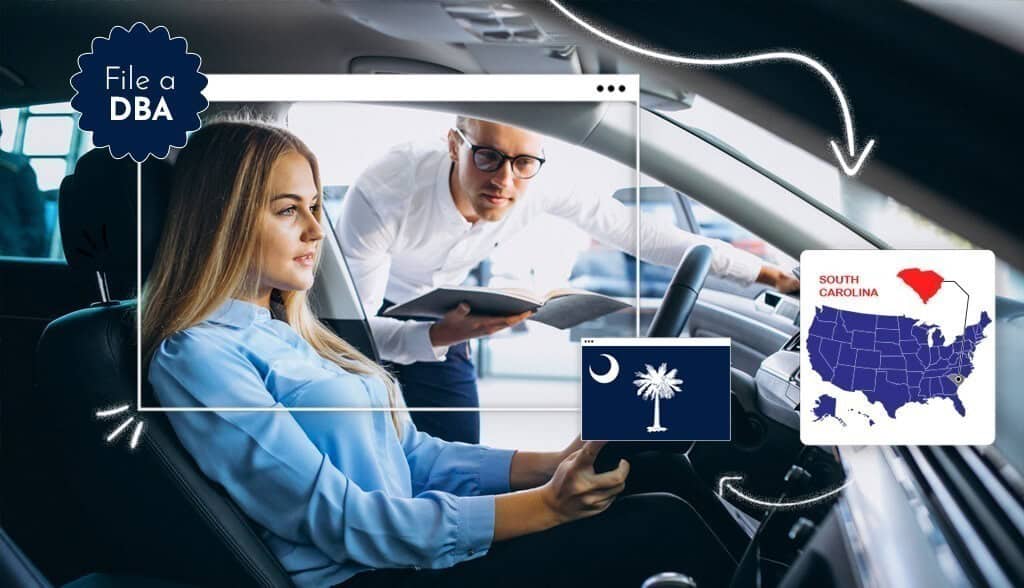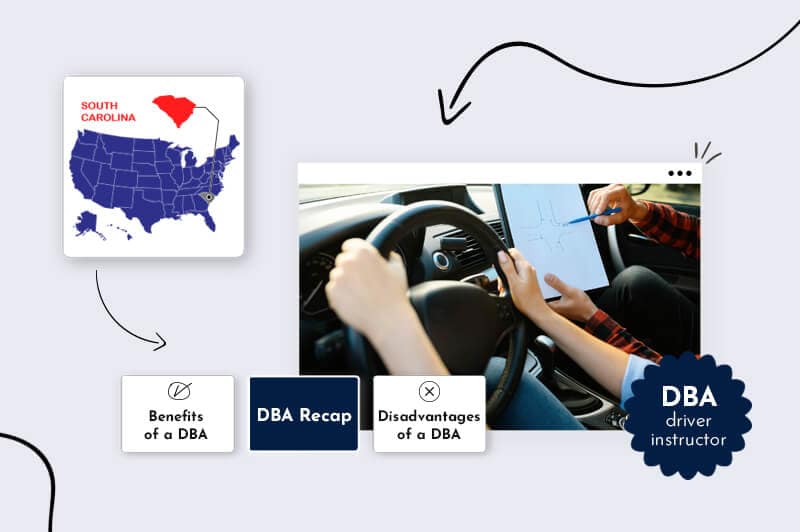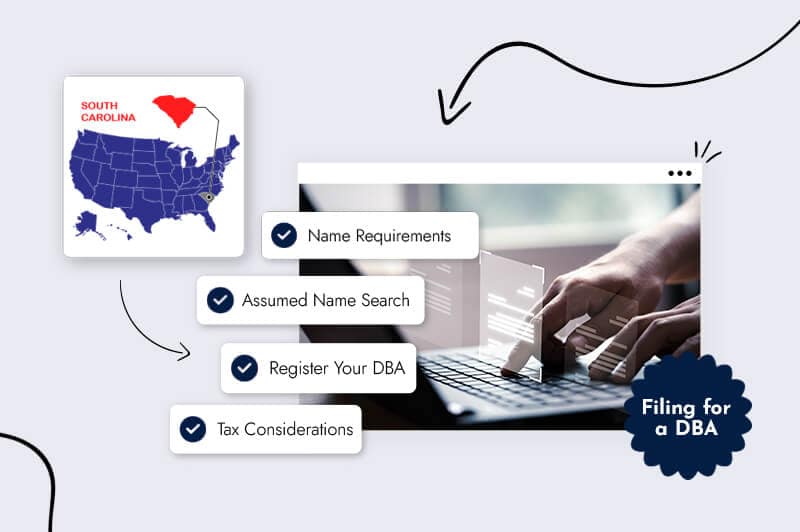
Every business in South Carolina must have a legal name, which it has to use for taxes and other official purposes. The legal name must be unique within the state, and it must meet certain requirements. For example, an LLC in SC must have the terms “Limited Liability Corporation,” “LLC,” or “L.L.C.” included within its name.
Many businesses also like to have one or more additional names besides their legal name that they can use when conducting business with the public. These names – called DBAs – are often more descriptive and easier to remember than the legal name. They help with branding.
For example, GMRI, Inc., is the legal name of a corporation that runs restaurants. When diners go out to eat, they don’t see a sign statiing “GMRI, Inc.” Instead, they see the more user-friendly DBA “Olive Garden” or “Red Lobster.”
In South Carolina, your business must have a legal name, and you must register it with the state. This is very different from DBAs, which are totally optional and (with one exception) cannot be registered with the state.

“DBA” is an acronym for “doing business as.” It’s a type of name for your business. Other terms for a DBA are “trading name,” “trade name,” “fictitious business name,” “registered business name,” and “assumed business name.” In South Carolina, “assumed name” and “fictitious name” are usually the most common terms you will see.
You can use a DBA in South Carolina instead of your business’s legal name to conduct business within the state.
Your business’s legal name will depend on what kind of structure you choose. For example, if you have an LLC, then the legal name is the name of the LLC. If you are a sole proprietor, then the legal name is your full personal name.
Most businesses, with the exception of limited partnerships, are not required to register their DBAs with the state.
Any type of business can use a DBA, including sole proprietorships, partnerships, LLCs, and corporations.
A DBA can be more appealing to customers than your business’s legal name. For example, if you have an LLC whose legal name is “Trimmings Industries, LLC,” you might want to run a store with the friendlier name “Buttons and Bows.”
If you have different product lines, you can use a different DBA for each one. If you have one store dedicated to selling buttons and another to selling bows, you could use two DBA names: “Beautiful Buttons” and “Bodacious Bows.”
If your personal name is part of your company’s legal name, a DBA can give you privacy.
You don’t need to get an employer identification number (EIN) if you’re running a sole proprietorship or a single-member LLC that doesn’t have employees.
Unlike an LLC, a DBA doesn’t provide any liability protection. That’s because the DBA isn’t a business entity. It just provides a way for you to operate your business under a fictitious name that’s different from the legal company name.
No. Having a DBA is completely optional in South Carolina. Whether you should get a DBA will depend on your business strategy.

A DBA can’t conflict with any business name that is registered with the South Carolina Secretary of State.
It also can’t contain any designator such as “L.L.C.” or “Limited Liability Company.” These terms indicate that a name is the legal name of the LLC. Since a DBA is not the legal name of the business, it should not include them.
DBAs (except for those for limited partnerships) are not registered with the state. The state has no record of them, so you can’t check to see if someone is already using the same DBA.
What you can and should do is check the state’s database of registered legal names to make sure your DBA does not duplicate any names that are on that list. You can do this easily online at the Secretary of State’s Business Name Search page.
Because your DBA is not registered with the state, you don’t have statewide protection against another business using the same name. If you want to prevent others from using your DBA, you should look into getting the name trademarked.
In South Carolina, unlike many other states, you do not register your DBA with the state. The Secretary of State’s office stopped registering DBAs sometime before 2006.
There is, however, one exception. A limited partnership has to file an Assumed Name Certificate of Limited Partnership with the state. This is the only type of business entity that can register its DBA in South Carolina statewide.
South Carolina law says that a DBA for a limited partnership cannot be “deceptively similar” to the name of any other limited partnership that conducts business within South Carolina or any other reserved business name.
There doesn’t appear to be any way to file the Assumed Name Certificate of Limited Partnership online.
To file the Assumed Name Certificate of Limited Partnership by mail:
The DBA South Carolina registration will be good for five years following the year you filed the Certificate of Assumed or Fictitious Name. You can renew the registration for the same time period no earlier than 90 days before it expires.
Although businesses other than limited partnerships don’t register their DBAs with the state, you may have to provide your DBA if you apply for a local business license from a town, city, or county. During the application process, you may be asked for the name of your business that is seen by the public. You cannot, however, apply for a local business license only to register a DBA.
To find out about any local requirements for naming your DBA, contact the clerk of the town, city, or county where you plan to get a business license.
For most entities (all businesses except for limited partnerships), there is no requirement to register a DBA. In fact, the South Carolina Secretary of State won’t even accept those registrations. So, there are no consequences for not registering.
The consequences for limited partnerships that fail to register a DBA don’t appear to be very harsh. South Carolina Code Section 33-42-45(e) says that such a failure won’t make any of the partnership’s contracts or acts invalid, won’t prevent the partnership from pursuing or defending lawsuits, and won’t cause a limited partner to assume general partner liability.
However, this is not legal advice, and you should always seek advice from a licensed South Carolina lawyer if you have any questions about potential penalties or liability.
The type of business structure you choose will affect your business’s tax obligations. For example, a corporation is taxed differently from a sole proprietorship.
A DBA, though, isn’t a type of business structure. It’s just a name that you can use for conducting business. So, a DBA has no effect whatsoever on how your company is taxed.
Getting one or more DBAs is optional but often useful for branding your business. In South Carolina, only limited partnerships have to register their DBAs with the state. You may, however, need to provide your DBA if you apply for a local business license from a town, city, or county.
This portion of our website is for informational or educational purposes only. Tailor Brands is not a law firm, and the information on this website does not constitute legal advice. All statements, opinions, recommendations, and conclusions are solely the expression of the author and provided on an as-is basis. Accordingly, Tailor Brands is not responsible for the information and/or its accuracy or completeness. It also does not indicate any affiliation between Tailor Brands and any other brands, services or logos on this page.
Products
Resources
©2025 Copyright Tailor Brands